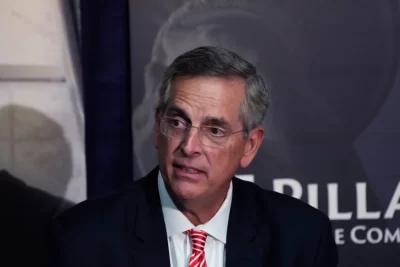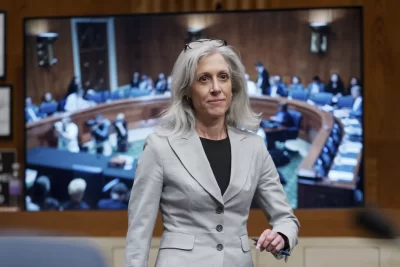
A court in Moscow upheld a 19-year prison sentence Tuesday for imprisoned Russian opposition leader Alexei Navalny, who was convicted on charges of extremism in August.
Navalny was found guilty on charges related to the activities of his anti-corruption foundation and statements by his top associates. It was his fifth criminal conviction and his third and longest prison term — all of which his supporters see as a deliberate Kremlin strategy to silence its most ardent opponent.
Navalny’s 19-year sentence will be backdated to Jan. 17, 2021, the day he was arrested. He was already serving a nine-year term on a variety of charges that he says were politically motivated before Tuesday’s ruling.
One of Navalny’s associates, Daniel Kholodny, who stood trial alongside him, also had his eight-year sentenced upheld Tuesday, according to the Russian state news agency Tass.
Navalny’s team said after the ruling Tuesday that the sentence was “disgraceful” and vowed to continue fighting “the regime.”
The politician is serving his sentence in a maximum-security prison, Penal Colony No. 6, in the town of Melekhovo, about 230 kilometers (more than 140 miles) east of Moscow. But he will now be transferred to another penal colony to serve out the rest of his sentence, according to Tass.
Navalny has spent months in a tiny one-person cell called a “punishment cell” for purported disciplinary violations. These include an alleged failure to button his prison clothes properly, introduce himself appropriately to a guard or to wash his face at a specified time.
Shortly before the sentence was upheld, Navalny, presumably via his team, posted about the prison conditions on his account on X, formerly known as Twitter, saying, “the cold is the worst.” Referring to the solitary confinement cells, Navalny said inmates are given special cold prison uniforms so that they cannot get warm.
The 47-year-old Navalny is President Vladimir Putin’s fiercest foe and has exposed official corruption and organized major anti-Kremlin protests. He was arrested in January 2021 upon returning to Moscow after recuperating in Germany from nerve agent poisoning that he blamed on the Kremlin.
Navalny’s allies said the extremism charges retroactively criminalized all of the anti-corruption foundation’s activities since its creation in 2011. In 2021, Russian authorities outlawed the foundation and the vast network of Navalny’s offices in Russian regions as extremist organizations, exposing anyone involved to possible prosecution.
At the time that Navalny received his 19-year sentence in August, U.N. human rights chief Volker Türk said Navalny’s new sentence “raises renewed serious concerns about judicial harassment and instrumentalisation of the court system for political purposes in Russia” and called for his release.
Navalny has previously rejected all the charges against him as politically motivated and accused the Kremlin of seeking to keep him behind bars for life.
On the eve of the verdict in August, Navalny released a statement on social media, presumably through his team, in which he said he expected his latest sentence to be “huge … a Stalinist term.” Under the Soviet dictator Joseph Stalin, millions of people were branded “enemies of the state,” jailed and sometimes executed in what became known as the “Great Terror.”
In his August statement, Navalny called on Russians to “personally” resist and encouraged them to support political prisoners, distribute flyers or go to a rally. He told Russians that they could choose a safe way to resist, but he added that “there is shame in doing nothing. It’s shameful to let yourself be intimidated.”





